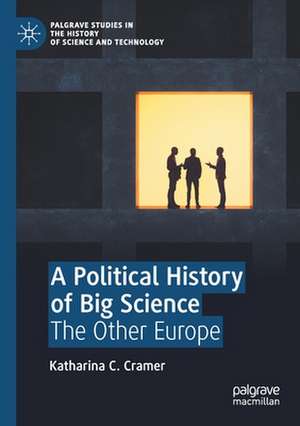A Political History of Big Science: The Other Europe: Palgrave Studies in the History of Science and Technology
Autor Katharina C. Crameren Limba Engleză Paperback – sep 2021
| Toate formatele și edițiile | Preț | Express |
|---|---|---|
| Paperback (1) | 724.32 lei 6-8 săpt. | |
| Springer International Publishing – sep 2021 | 724.32 lei 6-8 săpt. | |
| Hardback (1) | 728.43 lei 6-8 săpt. | |
| Springer International Publishing – sep 2020 | 728.43 lei 6-8 săpt. |
Din seria Palgrave Studies in the History of Science and Technology
-
 Preț: 352.16 lei
Preț: 352.16 lei -
 Preț: 223.88 lei
Preț: 223.88 lei -
 Preț: 491.21 lei
Preț: 491.21 lei - 18%
 Preț: 783.81 lei
Preț: 783.81 lei - 15%
 Preț: 645.93 lei
Preț: 645.93 lei - 18%
 Preț: 734.09 lei
Preț: 734.09 lei - 15%
 Preț: 698.94 lei
Preț: 698.94 lei - 15%
 Preț: 640.37 lei
Preț: 640.37 lei - 15%
 Preț: 695.01 lei
Preț: 695.01 lei -
 Preț: 385.25 lei
Preț: 385.25 lei -
 Preț: 323.28 lei
Preț: 323.28 lei -
 Preț: 332.33 lei
Preț: 332.33 lei -
 Preț: 389.11 lei
Preț: 389.11 lei - 18%
 Preț: 786.98 lei
Preț: 786.98 lei -
 Preț: 383.93 lei
Preț: 383.93 lei - 18%
 Preț: 772.30 lei
Preț: 772.30 lei - 18%
 Preț: 948.16 lei
Preț: 948.16 lei - 18%
 Preț: 795.83 lei
Preț: 795.83 lei - 18%
 Preț: 732.52 lei
Preț: 732.52 lei -
 Preț: 383.93 lei
Preț: 383.93 lei -
 Preț: 418.07 lei
Preț: 418.07 lei - 18%
 Preț: 731.91 lei
Preț: 731.91 lei - 18%
 Preț: 727.18 lei
Preț: 727.18 lei -
 Preț: 391.02 lei
Preț: 391.02 lei - 18%
 Preț: 729.68 lei
Preț: 729.68 lei -
 Preț: 398.35 lei
Preț: 398.35 lei - 15%
 Preț: 645.79 lei
Preț: 645.79 lei -
 Preț: 420.97 lei
Preț: 420.97 lei - 15%
 Preț: 582.80 lei
Preț: 582.80 lei -
 Preț: 213.58 lei
Preț: 213.58 lei - 18%
 Preț: 785.11 lei
Preț: 785.11 lei -
 Preț: 385.84 lei
Preț: 385.84 lei -
 Preț: 388.52 lei
Preț: 388.52 lei -
 Preț: 417.68 lei
Preț: 417.68 lei -
 Preț: 385.84 lei
Preț: 385.84 lei
Preț: 724.32 lei
Preț vechi: 883.31 lei
-18% Nou
Puncte Express: 1086
Preț estimativ în valută:
138.62€ • 144.18$ • 114.44£
138.62€ • 144.18$ • 114.44£
Carte tipărită la comandă
Livrare economică 14-28 aprilie
Preluare comenzi: 021 569.72.76
Specificații
ISBN-13: 9783030500511
ISBN-10: 3030500519
Pagini: 241
Ilustrații: XIX, 241 p. 5 illus.
Dimensiuni: 148 x 210 mm
Greutate: 0.35 kg
Ediția:1st ed. 2020
Editura: Springer International Publishing
Colecția Palgrave Macmillan
Seria Palgrave Studies in the History of Science and Technology
Locul publicării:Cham, Switzerland
ISBN-10: 3030500519
Pagini: 241
Ilustrații: XIX, 241 p. 5 illus.
Dimensiuni: 148 x 210 mm
Greutate: 0.35 kg
Ediția:1st ed. 2020
Editura: Springer International Publishing
Colecția Palgrave Macmillan
Seria Palgrave Studies in the History of Science and Technology
Locul publicării:Cham, Switzerland
Cuprins
Chapter 1: Introduction and Framework .- Chapter 2: Historical Viewpoints on Collaborative Large-Scale Research in Europe.- Chapter 3: Establishing the First Collaborative Synchrotron Radiation Facility in Europe: The Founding History of the ESRF (1977-1988).- Chapter 4: Founding the European XFEL: The Establishment of a Collaborative Free-Electron Laser, 1992-2009.- Chapter 5: Conclusion and Outlook.
Notă biografică
Katharina C. Cramer is a historian, specialised in the history and politics of science and technology as well as the power of knowledge and innovation in the twentieth and twenty-first centuries. She publishes on the topics of Big Science, research infrastructures and the politics of science, technology and knowledge.
Textul de pe ultima copertă
This book investigates the political history of Big Science in Europe in the late twentieth century and the early twenty-first century, characterised by the founding histories of two collaborative, single-sited facilities namely the European Synchrotron Radiation Facility (ESRF) in Grenoble, France and the European X-Ray Free-Electron Laser (European XFEL) in Schenefeld, Germany. Under the heading of the other Europe, this book presents the history and politics of European Big Science as an alternative road to (Western) European integration besides the mainstream political integration process of the European Economic Community and the European Union. It shows that Big Science has a role to play in European politics and policymaking and that the crucial and unavoidable symbiosis between science, technology and politics brings the creation of Big Science projects back to geopolitical realities.
Caracteristici
Sheds light on the recent history of Big Science and the role of techno-scientific expertise in the process of European integration Draws on two case studies which have not yet been previously explored from a political history perspective, offering an in-depth analysis of transnational collaborative research Appeals to scholars and students in the fields of European history, transnational history, history of science and technology, STS studies, as well as scientists and policymakers in the respective fields of physics
